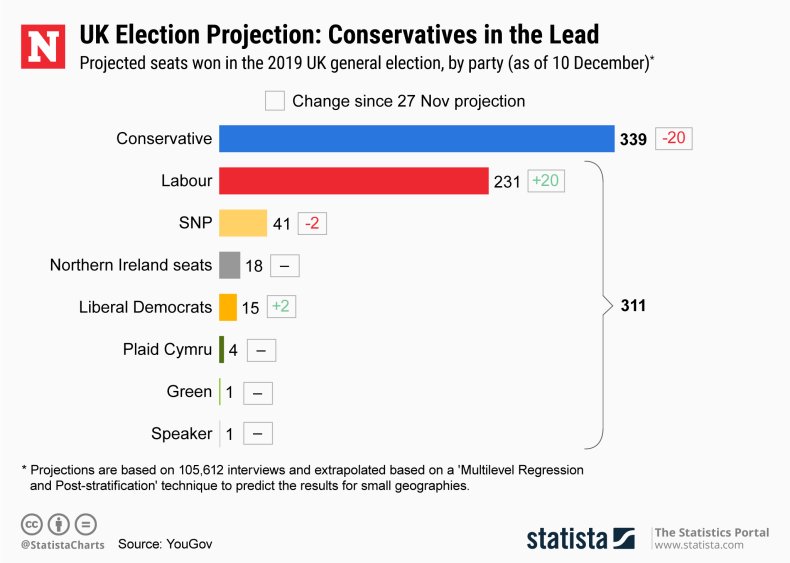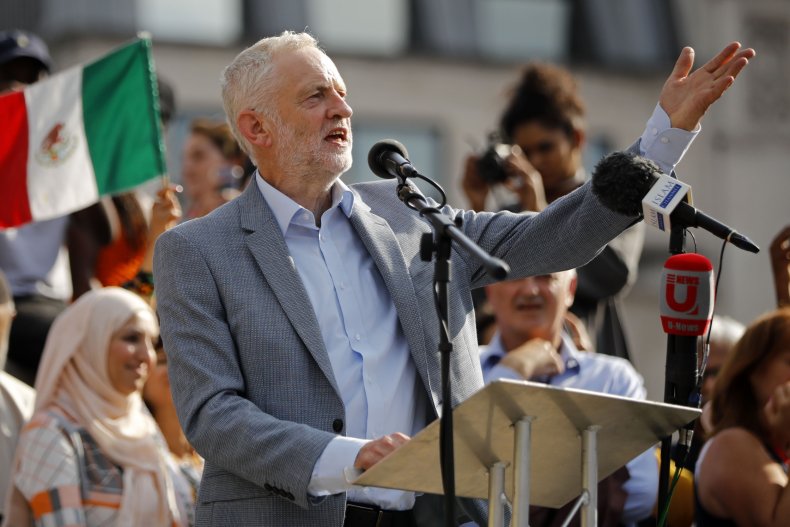Whatsapp Funny Jeremy Corbyn Donald Trump Johnson
President Donald Trump has made much of his love for the U.K. and stressed the importance of its partnership with the U.S. But this week's election in the U.K. may strain the sinews of the so-called "special relationship."
Conservative Party leader Boris Johnson, the incumbent prime minister and a man Trump calls his friend, is ahead in the polls and likely to win a parliamentary majority. However, the U.K. is just a polling error away from a hung parliament, which could well kill Johnson's premiership.
The man likeliest to assemble a government if no party wins a majority of seats in Thursday's House of Commons election is the opposition Labour Party leader Jeremy Corbyn, an avowed socialist promising a radical overhaul of the economy and political system.
Trump and Corbyn are both in their seventies, teetotallers and characterized as populist leaders. But this is about as far as their similarities go; they are wholly divided on most political, economic and societal issues.
"I can work with anybody, I'm a very easy person to work with," Trump said during the recent NATO summit near London, England, about the prospect of dealing with Corbyn as prime minister.
It is clear from their short history of words about one another, however, that a Corbyn-Trump relationship would be fraught at best and dead on arrival at worst.
Trump has focused more on boosting Johnson than trashing Corbyn, interventions that are not always seen as helpful by the Conservative Party because of the president's deep unpopularity among the British public.
Corbyn has been more direct, accusing Trump of spreading hatred, wrecking the environment, threatening peace and violating international law, particularly the rules on the treatment of children after revelations that young undocumented migrants were being held in cages.
"Corbyn would be so bad for your country. He'd be so bad, he'd take you in such a bad way. He'd take you into such bad places," Trump said on the radio station LBC at the end of October during a show presented by the Brexit Party leader Nigel Farage.
The Labour leader responded swiftly on Twitter.
"Donald Trump is trying to interfere in Britain's election to get his friend Boris Johnson elected," Corbyn tweeted. "It was Trump who said in June the NHS is 'on the table'. And he knows if Labour wins US corporations won't get their hands on it. Our NHS is not for sale."
Trump has promised to put the U.K. at the front of the queue for a trade deal once Brexit—the act of leaving the European Union—is done. Talks on a trade deal are already taking place between Westminster and Washington.
But during the election campaign, Corbyn produced a secret government document—reportedly released into the public domain by Russian hackers—that detailed the nature of those talks, and accused Johnson of trying to sell off the National Health Service (NHS) to the U.S.
The NHS is a state-run healthcare system funded through general taxation, free at the point of delivery to service users. It is a cherished institution in the U.K. and a major political battleground. Labour has accused the Conservatives of severely underfunding the service.
Johnson has said repeatedly that the NHS is not on the table in trade talks with the U.S. After first suggesting that the NHS would be part of trade talks a few months ago, Trump in December recanted, saying that "we want nothing to do with it."
During Trump's visit, Corbyn emphasized that he would not countenance including the NHS in a post-Brexit trade deal with the U.S. It is clear he does not trust the words of Johnson or Trump.
"I very gently and quite simply—but extremely firmly—say this: In any trade deal with the United States, with a Labour government, public services will not be put on the table. Our NHS will not be put up for sale to anybody," Corbyn said.
Corbyn had joined the protests against Trump's state visit to the U.K. earlier in the year—an invitation to the president that he opposed in the first place—and delivered an impassioned speech to a boisterous rally in central London.
He spoke against hatred, such as racism and misogyny, and defended London Mayor Sadiq Khan against the president's attacks on the city's Muslim leader—blaming him for terror attacks—that were widely viewed as Islamophobic.
Corbyn suggested the president was using his platform to foment hatred and sow division.
At a press conference, a reporter asked Trump about Corbyn's presence at the protest against his state visit. Trump said he rejected Corbyn's attempt to meet him.
"I don't know Jeremy Corbyn. Never met him. Never spoke to him. He wanted to meet today or tomorrow and I decided that I would not do that," Trump said.
"I think that he is, from where I come from, somewhat of a negative force. I think that people should look to do things correctly as opposed to criticize. I really don't like critics as much as I like and respect people that get things done."
Corbyn's comments echoed his speech a year before during Trump's 2018 visit. Corbyn had addressed a large protest against the president then, too. "Build bridges not walls," he said, rebuking Trump's southern border wall with Mexico.
"When a government condemns children because they're Mexican, Guatemalan, or from somewhere else in Central America, and so ill-treats them on the border, that is a breach of every international convention that I understand about the rights of the child."
Corbyn also made reference—and not for the first time—to Trump's infamous "Muslim ban," saying: "When somebody on a global stage condemns Muslims because they're Muslims, it's not acceptable and we will call it out."
Two years ago, Corbyn made a speech to the U.N. in which he said Trump's "disgraceful Muslim ban and his anti-Mexican rhetoric have fuelled racist incitement and misogyny," and accused him of being a "threat to peace" that should "deeply trouble us all."
At the time of Trump's ban, which placed travel restrictions on several Muslim-majority countries purportedly for security reasons, Corbyn tweeted: "Donald Trump's Muslim ban is shameful and discriminatory. It stokes hatred and violates essential human rights."
The Labour leader had also said that Trump should not be invited to the U.K. until his travel ban was lifted and the U.S. allowed more refugees to seek asylum there.
"Is it really right to endorse somebody who has used this awful misogynist language throughout the election campaign, awful attacks on Muslims, and then, of course, this absurd idea of building a wall between themselves and their nearest neighbor," Corbyn said on ITV's Peston on Sunday show shortly after Trump's inauguration in January 2017.
After Trump won the election in 2016, Corbyn attacked the "fake anti-elitism of rich, white men—like Nigel Farage and Donald Trump," BBC News reported, adding that it "is farcical at one level, but in reality it's no joke at all."
"We've seen a similar phenomenon in the US since last week's presidential election as we saw after Brexit: an appalling rise in hate crime," Corbyn said. "Saying anything to win a vote has consequences on the ground afterwards."
This August, amid speculation that Corbyn would use a no-confidence motion in the House of Commons to try to oust Johnson as prime minister, Trump weighed in.
"Would be very hard for Jeremy Corbyn, the leader of Britain's Labour Party, to seek a no-confidence vote against New Prime Minister Boris Johnson, especially in light of the fact that Boris is exactly what the U.K. has been looking for, & will prove to be 'a great one!'," Trump tweeted.
Speaking in a House of Commons debate in October, Corbyn accused the British government of "continuing to cozy up to Donald Trump, and sitting idly by as he wrecks the world's efforts to tackle climate change and nuclear proliferation."
The U.K. election takes place on Thursday. Corbyn's Labour is, the polls suggest, behind the Conservatives. But because of how the constituency-based system works in electing the House of Commons, the race is potentially much closer than the headline polling suggests.
The graphic below, provided by Statista, illustrates projected parliamentary seats won as of December 10 YouGov data.

A majority Labour government remains possible, though unlikely, and Corbyn's best hope is to lead a loose coalition of anti-Conservative parties with whose support he could become prime minister.
Johnson's campaign is under scrutiny for allegedly lying about what his Brexit deal entails, running highly misleading political advertising, his avoidance of certain televised debates and interviews, and his governing party's years of painful, self-defeating fiscal austerity.
Corbyn's campaign is dogged by an anti-Semitism scandal about the Labour Party, as well as questions about the economic viability of his huge public spending and nationalization plans, and a Brexit policy attacked as unclear and trying to have it both ways on the issue.
Traditionally, U.S. presidents are among the first leaders to call with congratulations to the new British prime minister as they become leader of America's closest ally. On Friday morning, however, should Corbyn enter Number 10, Trump may prefer to tweet about it instead.

This article was updated to include an infographic.
Source: https://www.newsweek.com/donald-trump-boris-johnson-quotes-uk-election-1476681
0 Response to "Whatsapp Funny Jeremy Corbyn Donald Trump Johnson"
Post a Comment